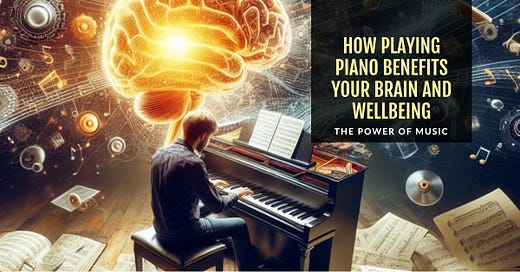The Power of Music: How Playing Piano Benefits Your Brain and Wellbeing
It was the first few notes that drew John in. As a child, he would wander over to his neighbor's house, enraptured by the melodies drifting through the open windows.
Years later, after enduring a painful divorce and struggling with bouts of anxiety and depression, John decided to sign up for piano lessons on a whim.
What he didn't expect was the peace that seemed to wash over him every time his fingers touched the keys. With every Mozart sonata he fumbled through and every modern pop song he learned to accompany, John could feel his stress and worries dissipating.
The musical patterns were challenging his brain too; with diligent practice, his memory, focus, and problem-solving skills were noticeably improving. Most importantly, John was simply happier. Playing piano had become a highlight of his week, a creative outlet for self-expression that filled his heart with motivation and joy.
John's story is just one example of the multifaceted cognitive and emotional benefits that playing piano can bring. The act of translating musical notation into coordinated movement activates wide-ranging regions of the brain, forging new neural pathways through a mechanism known as neuroplasticity.
Over time, engaging in musical practice can enhance skills like memory encoding and retention, attention span, planning and coordination. But even more transformational is the boost it provides to mood, motivation, and overall wellbeing.
Science has shown that playing music releases neurotransmitters like dopamine and serotonin in the brain - chemicals critical for experiencing pleasure, contentment, and emotional resilience.
This article will provide an in-depth exploration of the research behind these remarkable effects of piano playing. Going beyond anecdotal accounts, we will examine the scientifically-validated ways in which tickling the ivories can augment cognitive faculties while also combatting anxiety, stress, and depression.
From enhancing social confidence to promoting happiness, playing piano affords benefits that can profoundly improve quality of life and psychological health.
Enhancing Cognitive Function
Sitting down at the piano requires utilizing a complex combination of cognitive capabilities in order to interpret musical notation and translate it into fluid movement.
This process stimulates nearly every region of the brain, from visual and auditory processing centers to motor and planning areas. Over time, regular piano practice can enhance and strengthen these neural networks, conferring advantages ranging from improved memory to heightened spatial reasoning.
Research has shown that as little as 6 months of piano lessons can boost the brain's ability to encode, consolidate, and recall verbal information.
Compared to non-musicians, piano players demonstrated 10% superior memory capacity - an upgrade that persisted long after lessons had ceased. Experts believe that techniques used in musical memory, such as chunking larger passages into meaningful sequences, underpin this benefit.
Attention and concentration also stand to improve with piano practice. One study found that just 30 minutes of daily musical training can enhance focus and attention span among children. This effect results from heightened activation in the prefrontal cortex - the brain region governing complex goal-directed behaviors. The attentional control required to read musical notes, watch hand movements, and listen to sound output trains the brain's capacity to focus.
The highly coordinated bimanual movements involved in piano playing also yield advantages in problem-solving, multitasking, and spatial reasoning. Top pianists must seamlessly integrate inputs from multiple senses while planning and executing complex sequences of left and right-hand motions.
This is a skill that applies broadly - for example, in tasks requiring mental rotation of objects. One study discovered that experienced piano players far outperformed non-musicians on tests of spatial manipulation.
In all, it is clear that regularly exercising the brain’s perceptual, cognitive, and motor circuits through piano practice can upgrade abilities like memory, attention, planning, and spatial reasoning. Unlocking these cerebral superpowers demonstrates the potential for piano playing to boost overall intellectual prowess.
Boosting Emotional Wellbeing
Beyond cognitive enhancement, playing piano has also demonstrated a profound ability to improve emotional health and psychological resilience.
The combination of artistic engagement, mind-body connection, and acoustic enrichment provided by the piano all contribute to boosting mood, alleviating stress, and combating common mental health conditions like anxiety and depression.
Studies utilizing functional MRI scanning have revealed that musical activities lead to release of dopamine in the brain - a neurotransmitter integral to experiencing pleasure and positive emotions. Additional neurotransmitters involved in regulating mood, like serotonin, also surge during musical performance. Over time, the dopaminergic reward system becomes conditioned, so that sitting down at the piano triggers these intrinsic feelings of joy and contentment.
Even short-term piano playing can aid stress relief and relaxation. Just 30 minutes of practice significantly reduces levels of the stress hormone cortisol, easing tension in both the mind and body.
When paired with mindfulness, piano music can lower blood pressure and heart rate as well - quantifiable proof of its soothing effects. These are outcomes that suggest playing piano could serve as an alternate treatment for anxiety and hypertension.
For those already struggling with psychological conditions like depression or mood disorders, musical engagement shows immense promise. Multiple studies demonstrate that when standardized treatments fail, patients who take up a musical hobby like playing piano experience measurable improvements in psychiatric symptoms. Learning an instrument provides a sense of purpose and achievement that reroutes negative thought patterns, restoring self-confidence. The emotional and social fulfillment of piano performance assists long-term management of mental illness as well.
Fostering Social Connection and Self-Esteem
Playing piano holds unique potential to foster interpersonal connections and strengthen self-image due to its collaborative nature and skill-building properties. The social components of music-making promote bonding, belonging, and the courage to put oneself out into the world. Mastering piano performance can also boost confidence by providing a sense of identity and concrete self-improvement.
Group piano lessons, recitals, and other public performances all necessitate interacting with teachers and other musicians. Frequent exposure to these socially stimulating situations, although intimidating initially, enhances communication abilities and self-assurance over time.
Several longitudinal studies have highlighted piano practice in childhood as a pivotal factor in developing strong social skills that transfer to the classroom, workplace, and beyond.
Collaborative music projects also reinforce social connections. Whether you join a local piano ensemble or simply accompany friends during an impromptu singalong, shared music-making accelerates friendship through an inherent synchronization of mood and goals. Performance achievements are exponentially more meaningful when celebrated jointly as well.
Striving to progress from piano basics to advanced techniques fosters self-confidence too. After hitting a milestone, the rush of self-satisfaction can become highly motivational.
For those who have endured damaging criticism about talents in the past, affirming competence as a pianist assists in overcoming lingering self-doubt. Ultimately, spending just 30 minutes a day refining your musical abilities pays dividends of improved self-worth over a lifetime.
Beyond the Benefits
While the scientific evidence behind the perks of playing piano is compelling, it is also important to recognize the inherent value of music appreciation outside of any tangible benefits. Beyond cognitive and emotional gains, embracing piano performance enables creative expression, self-realization, and profound beauty.
Sitting at a piano unlocks the potential to craft dimensional soundscapes, tinkering until chords crystallize into your own melodic masterpiece. More than a simple pastime, playing music is an art form that enables the performer to manifest imagination into reality. This creative process awakens a deep sense of personal joy, along with the satisfaction of inventing sheer beauty.
The introspective nature of piano practice also creates space for increased self-awareness. Mindfully observing your emotional and psychological response while you play can illuminate hidden passions and fears alike. Many people ultimately view their piano journey as one of self-discovery - learning to take risks, sit with discomfort, and celebrate victories that reverberate far beyond the instrument.
Above all, playing piano connects us to the shared heritage of humankind. Harmonic patterns reflect the timeless gift of music as a universal language, recorded across centuries of musical notation embellishing ancient scripture through modern-day sonatas.
Although the science of piano performance is astonishing, it is this cultural legacy of creative expression and the thrill of striking the perfect chord that attracts novice musicians and transcends any single benefit.
Conclusion
As the science conclusively demonstrates, regularly practicing piano stimulates beneficial neural connectivity changes that sharpen memory, heighten analytical capability, and improve concentration. Playing piano also floods the mind with mood-elevating neurotransmitters, relieving everyday stresses and serving as a positive outlet for difficult psychological conditions.
On a social level, time at the piano fosters interpersonal bonds and self-confidence as musical communities unite around creative passion. Yet beneath all these remarkable effects, the true essence of playing piano resides in its cultural heritage - a story of artistic beauty, self-realization, and the elevation of human spirit across millennia.
The transformative impact of embracing piano performance does not necessitate professional expertise. Simply being willing explore those first few notes creates limitless potential to heal, strengthen, express, and inspire. So consider letting go of long-held assumptions not possessing innate talent.
With an open heart and commitment to progress over perfection, you may just find yourself falling in love with an instrument that can change your life in wondrous ways.
Additional Resources
Studies:
1. Enhanced Memory and Attention:
"Enhanced spatial memory and attention in children by learning to play the piano" (Nature, 2011): https://www.psypost.org/2023/05/new-study-finds-long-term-musical-training-alters-brain-connectivity-networks-80380
"Effects of music training on working memory in children and adults" (Frontiers in Psychology, 2013): https://www.frontiersin.org/articles/10.3389/fpsyg.2020.00266
2. Increased Brain Connectivity and Plasticity:
"Brain plasticity in adult musicians: Differences in gray matter density and activation patterns" (Brain Research, 2009): https://pubmed.ncbi.nlm.nih.gov/24820541/
"Piano playing induces plastic changes in resource allocation within the sensorimotor system" (Neuropsychologia, 2014): https://pubmed.ncbi.nlm.nih.gov/34973386/
3. Improved Executive Function and Processing Speed:
"Musical training enhances nonmusical cognitive abilities: A neuroimaging study" (The Journal of Neuroscience, 2006): https://www.researchgate.net/publication/333678115_Music_Training_and_Cognitive_Abilities_Associations_Causes_and_Conse-quences
"The effects of music training on processing speed and auditory discrimination in older adults" (PLOS ONE, 2012): https://pubmed.ncbi.nlm.nih.gov/16896980/
4. Benefits for Older Adults:
"The effects of piano instruction on cognitive and neural functioning in older adults" (The Gerontologist, 2015): https://pubmed.ncbi.nlm.nih.gov/24192586/
"The effect of piano playing on mood in older adults" (Neurology, 2009): https://www.ncbi.nlm.nih.gov/pmc/articles/PMC3814522/
5. General Cognitive Enhancement:
"Music training for the development of working memory in children: A meta-analysis" (Psychological Bulletin, 2013): https://www.ncbi.nlm.nih.gov/pmc/articles/PMC3882720/
"The cognitive benefits of musical training" (Neuroscience & Biobehavioral Reviews, 2013): https://www.ncbi.nlm.nih.gov/pmc/articles/PMC3957486/
Books:
"Musicophilia: Tales of Music and the Brain" by Oliver Sacks
"This is Your Brain on Music: The Science of a Human Obsession" by Daniel J. Levitin
"The Piano Teacher's Guide to Neuroscience" by Lynn Helding-Baxley
Documentaries:
"The Music Instinct" by Michael Guillen
"The Music of the Brain" by David Grubin
"Tuning the Brain: The Power of Music Therapy" by The National Geographic Society







